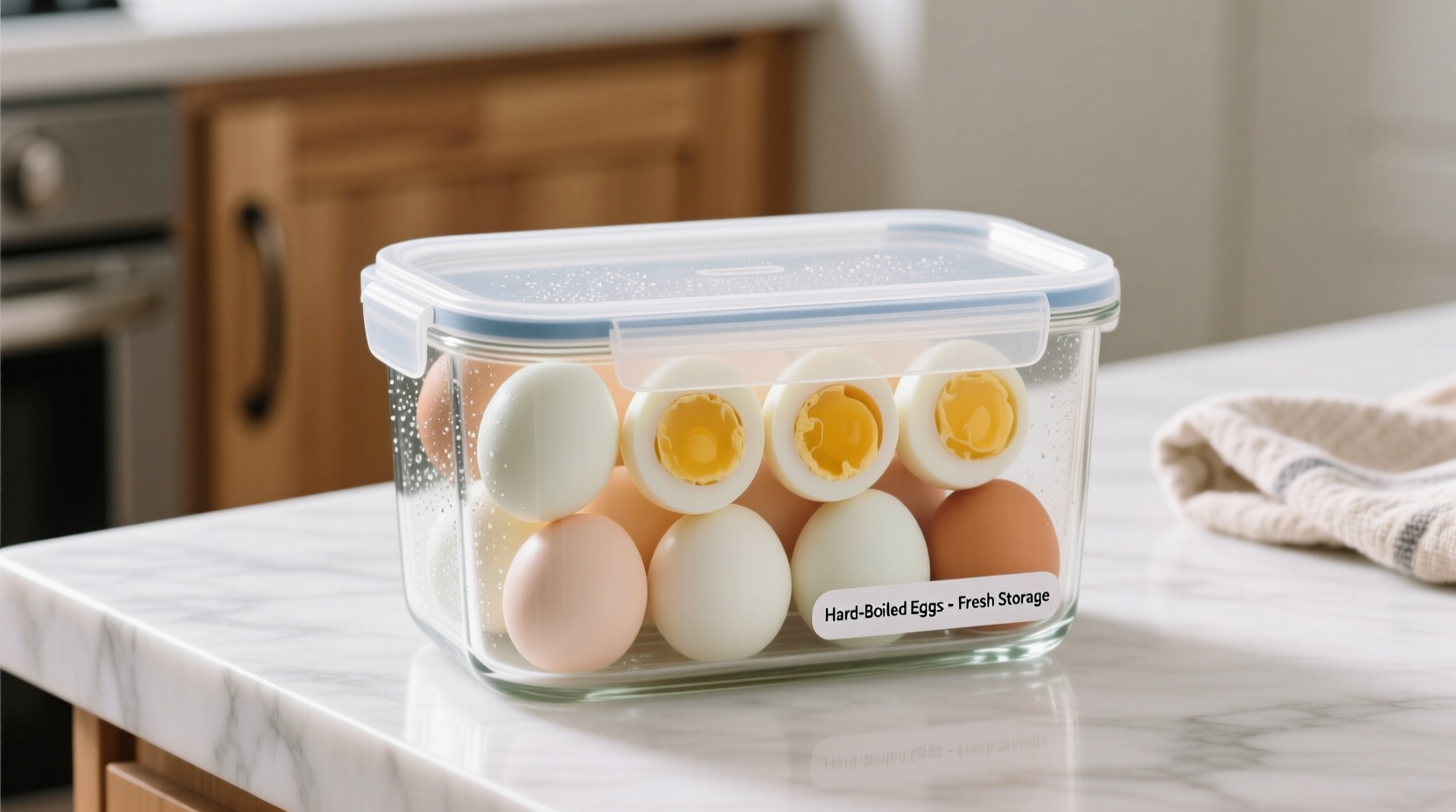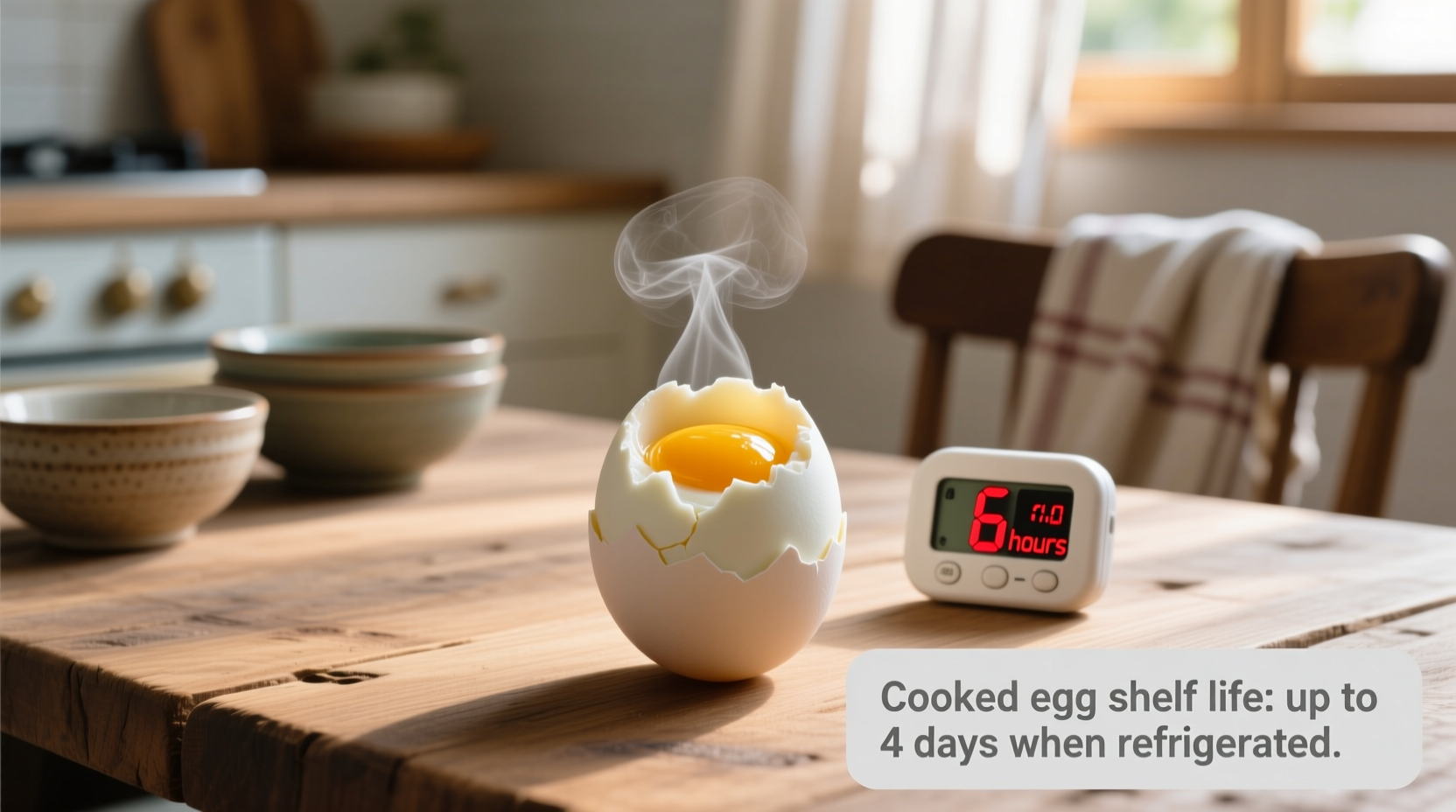Most cooked eggs stay safe to eat for 3-4 days when properly refrigerated at 40°F (4°C) or below. Hard-boiled eggs last slightly longer—up to 1 week in the refrigerator. Never leave cooked eggs at room temperature for more than 2 hours (1 hour if temperatures exceed 90°F).
Understanding exactly how long is a cooked egg good for prevents food waste while keeping your family safe from foodborne illness. Whether you've prepared scrambled eggs for meal prep, hard-boiled eggs for snacks, or deviled eggs for a party, proper storage timing is critical for food safety.
Why Proper Cooked Egg Storage Timing Matters
Eggs are highly perishable and provide an ideal environment for bacteria like Salmonella to multiply rapidly when stored incorrectly. According to the USDA Food Safety and Inspection Service, cooked eggs represent one of the most common sources of foodborne illness when mishandled.
Professional chefs like myself who've worked in both high-volume restaurant kitchens and home cooking environments know that precise timing isn't just about quality—it's a critical food safety requirement. The difference between safely enjoying leftovers and risking illness often comes down to hours, not days.
Cooked Egg Storage Timeframes by Preparation Method
Not all cooked eggs have identical shelf lives. Different preparation methods affect how quickly bacteria can grow:
| Egg Preparation | Refrigerator (40°F or below) | Room Temperature | Freezer |
|---|---|---|---|
| Scrambled or fried eggs | 3-4 days | 2 hours max | 1-2 months (texture suffers) |
| Hard-boiled eggs (peeled) | 3-4 days | 2 hours max | Not recommended |
| Hard-boiled eggs (unpeeled) | 7 days | 2 hours max | Not recommended |
| Egg salad or deviled eggs | 3-4 days | 1 hour max | Not recommended |
This cooked egg shelf life chart reflects guidelines from the FDA FoodKeeper app and USDA recommendations. Note that egg salads and deviled eggs have shorter safe periods due to additional ingredients like mayonnaise that accelerate spoilage.
Proper Storage Techniques That Extend Freshness
How you store cooked eggs matters as much as timing. Follow these professional kitchen practices:
- Immediate cooling: Place cooked eggs in shallow containers to cool faster—never stack hot eggs in deep containers
- Airtight containers: Use containers with tight-fitting lids to prevent moisture loss and odor absorption
- Refrigerator placement: Store in the main compartment (not the door) where temperatures remain most consistent
- Label everything: Note preparation date with marker directly on containers

How to Tell If Cooked Eggs Have Gone Bad
Before consuming leftovers, perform these quick safety checks for how long is a cooked egg good for in your specific situation:
- Smell test: Discard immediately if you detect sulfur, sour, or unpleasant odors—fresh cooked eggs have mild aroma
- Texture check: Slimy or excessively dry surfaces indicate spoilage
- Visual inspection: Look for mold growth, unusual discoloration, or greenish tints
- Time verification: If you're unsure when cooked, follow the "when in doubt, throw it out" rule
Hard-boiled eggs present special challenges since the shell can mask spoilage signs. The American Egg Board recommends placing questionable hard-boiled eggs in water—fresh ones sink and lay flat while spoiled eggs float due to gas buildup.
Special Considerations for Different Cooking Methods
Understanding how long is a cooked egg good for requires considering preparation specifics:
Hard-Boiled Eggs: The 7-Day Rule
Unpeeled hard-boiled eggs maintain quality longer because the shell provides a protective barrier. The USDA FoodData Central confirms that properly cooled hard-boiled eggs stay safe for exactly 7 days refrigerated. After this point, the protective membrane inside the shell deteriorates, allowing bacteria to penetrate.
Egg Dishes with Additional Ingredients
Dishes like quiches, frittatas, and egg casseroles follow the same 3-4 day rule but require special attention to other ingredients. Dairy-based dishes spoil faster than vegetable-based preparations. Always store these in shallow containers no deeper than 2 inches to ensure even cooling.
Safety Risks of Consuming Spoiled Cooked Eggs
Eating eggs beyond their safe storage window risks Salmonella poisoning, which causes:
- Nausea and vomiting within 6-48 hours
- Severe abdominal cramps
- Diarrhea (sometimes bloody)
- Fevers exceeding 100.4°F (38°C)
Vulnerable populations including children under 5, adults over 65, pregnant women, and immunocompromised individuals face higher risks of hospitalization from foodborne illness. The CDC reports that eggs cause approximately 79,000 cases of foodborne illness annually in the United States.
Practical Tips for Maximizing Cooked Egg Safety
Implement these professional kitchen techniques to safely extend your cooked scrambled eggs shelf life and other preparations:
- Cool rapidly: Place hot cooked eggs in an ice bath for 5-10 minutes before refrigerating
- Portion control: Divide large batches into single-serving containers to minimize temperature fluctuations
- Reheat properly: Bring leftovers to 165°F (74°C) internal temperature when reheating
- Never top up: Don't add fresh cooked eggs to containers with older leftovers
Remember that freezer storage significantly extends how long is a cooked egg good for, but affects texture. Frozen scrambled eggs work well in casseroles but become watery when thawed for standalone dishes.
When Leftovers Become Unsafe: Clear Disposal Guidelines
Follow these unambiguous disposal rules to prevent illness:
- Discard cooked eggs left at room temperature longer than 2 hours (1 hour above 90°F)
- Throw out refrigerated eggs exceeding 4 days (7 days for unpeeled hard-boiled)
- Immediately discard eggs with any visible mold growth
- Dispose of containers showing condensation or slimy residue
Food safety experts universally agree: it's never worth risking illness to save leftovers. The minimal cost of replacing eggs pales in comparison to potential medical expenses from foodborne illness.
Final Safety Checklist Before Consuming Leftover Eggs
Before eating any cooked egg leftovers, verify these five points:
- Storage duration falls within USDA-recommended timeframes
- Refrigerator maintained at 40°F (4°C) or below
- No unusual odors detected
- No visible signs of spoilage
- Proper reheating to 165°F (74°C) for non-hard-boiled preparations
By following these evidence-based guidelines for how long is a cooked egg good for, you'll significantly reduce foodborne illness risks while minimizing unnecessary food waste. Remember that when it comes to egg safety, precision in timing isn't optional—it's essential for protecting your health.











 浙公网安备
33010002000092号
浙公网安备
33010002000092号 浙B2-20120091-4
浙B2-20120091-4